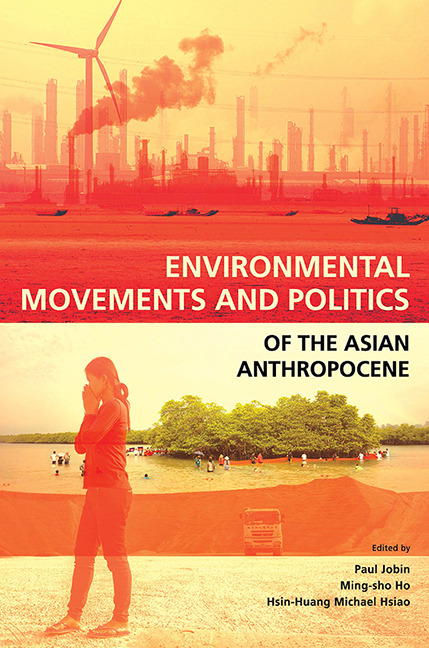Book contents
- Frontmatter
- Contents
- List of Tables, Maps and Figures
- Acknowledgements
- About the Contributors
- 1 Environmental Movements and Politics of the Asian Anthropocene: An Introduction
- 2 Environmental Movements in Taiwan’s Anthropocene: A Civic Eco-Nationalism
- 3 Environmental Movements in Post-handover Hong Kong: Between Managerialism and Radicalism
- 4 The Post-politics of Environmental Engagement in Singapore
- 5 Environmental Movements in the Philippines: Contestation for Justice in the Anthropocene
- 6 Environmental NGOs in “Post-New Order” Indonesia: Saving the Forests Through Democracy
- 7 Environmental Activism in Malaysia: Struggling for Justice from Indigenous Lands to Parliamentary Seats
- 8 State, NGOs, and Villagers: How the Thai Environmental Movement Fell Silent
- 9 Environmental Movements in Vietnam under One-Party Rule
- 10 The Cambodian Neopatrimonial State, Chinese Investments, and Anti-dam Movements
- 11 Conclusion: Environmental Movements and Political Regimes, or Why Democracy Still Matters in the Anthropocene
- Index
2 - Environmental Movements in Taiwan’s Anthropocene: A Civic Eco-Nationalism
Published online by Cambridge University Press: 08 October 2021
- Frontmatter
- Contents
- List of Tables, Maps and Figures
- Acknowledgements
- About the Contributors
- 1 Environmental Movements and Politics of the Asian Anthropocene: An Introduction
- 2 Environmental Movements in Taiwan’s Anthropocene: A Civic Eco-Nationalism
- 3 Environmental Movements in Post-handover Hong Kong: Between Managerialism and Radicalism
- 4 The Post-politics of Environmental Engagement in Singapore
- 5 Environmental Movements in the Philippines: Contestation for Justice in the Anthropocene
- 6 Environmental NGOs in “Post-New Order” Indonesia: Saving the Forests Through Democracy
- 7 Environmental Activism in Malaysia: Struggling for Justice from Indigenous Lands to Parliamentary Seats
- 8 State, NGOs, and Villagers: How the Thai Environmental Movement Fell Silent
- 9 Environmental Movements in Vietnam under One-Party Rule
- 10 The Cambodian Neopatrimonial State, Chinese Investments, and Anti-dam Movements
- 11 Conclusion: Environmental Movements and Political Regimes, or Why Democracy Still Matters in the Anthropocene
- Index
Summary
Over the last two decades, despite threats and pressure from China, Taiwan has consolidated its democracy and its identity in the international community. So, too, have its environmental movements. Hsin-Huang Michael Hsiao (1999) has described how the emergence of an environmental movement in the mid-1980s played a significant role in the popular mobilization that put an end to forty years of authoritarianism, paving the way for the country's democratization. Hsiao further defined the three pillars—or what he prefers to call streams, a more dynamic and natural metaphor—of that environmental mobilization as follows: (1) a grassroots, victim-conscious, anti-pollution movement against heavy industry; (2) an urban middle-class movement for the conservation of natural habitats and animal species; and (3) an anti-nuclear movement, which the author detached from anti-pollution protests to emphasize a greater level of public concern and connection with national politics.
Nearly twenty years later, in addition to these three streams of mobilization, Hsiao (2017) notes the emergence of two additional movements: 4) a movement against high-tech industrial hazards that arose around the turn of the century and bears characteristics distinct from the initial anti-pollution protests (see also Tu 2007, 2017a; Tu and Lee 2009; Chiu 2011, 2014); and 5) a movement for energy transition toward a low-carbon society (see also Hsu et al. 2016). Kuei-tien Chou (2015, 2017) further argues that Taiwan's anti-pollution movements are now reshaping their episteme to cope with the new challenges of climate change; the fight against industrial hazards now goes hand in hand with a struggle to reduce the intensive consumption of energy and natural resources like water. Indeed, among the three hundred associations registered by the Environmental Protection Administration (EPA), around thirty claimed that global warming is their main matter of concern.
This trend suggests that Taiwan's environmental movements have reached a critical turn, which reflects the dynamism of Taiwanese civil society and its solid connections with the international community. The notion of the Anthropocene has also prompted academic discussions, though thus far they remain limited to a small circle (e.g., Lin 2018; Chuang 2020; Lee 2020; Chuang and Gong 2020).
- Type
- Chapter
- Information
- Publisher: ISEAS–Yusof Ishak InstitutePrint publication year: 2021

